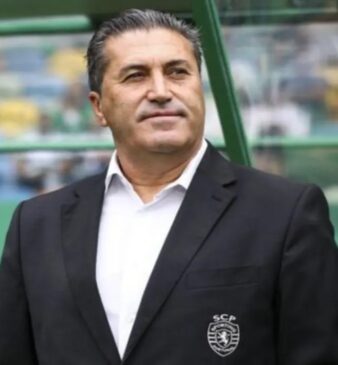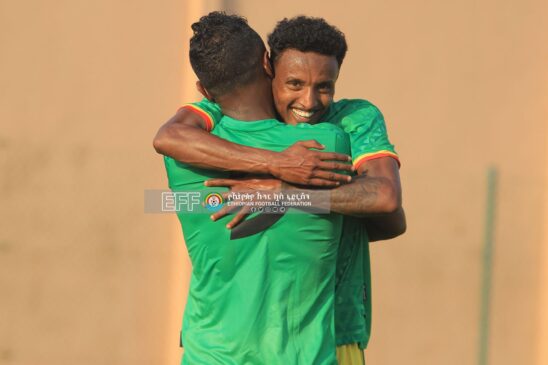Neguse Gebre’s Long Journey to Train the Youth in East
The long time Omedla and national football player Neguse Gebre made a long journey to the eastern part of Oromia State to share his knowledge to the youth. Neguse who was born in 1955 in Addis Ababa, at Kebena area had a unique quality of playing in all three places with equal footing: as a scorer, midfielder and defender. He gives credit to his Kokebe Tsibah sport teacher Haile-Selassie Worke for connecting him with Berari Kokeb Football Club in 1971 where he stayed for three years before he joined Omedla, the Police Football Club in 1974. Starting from 1974 he played for both his club Omedla and the national team for 16 years. Neguse talked about his rich football experiences as a player and coach. Excerpts:
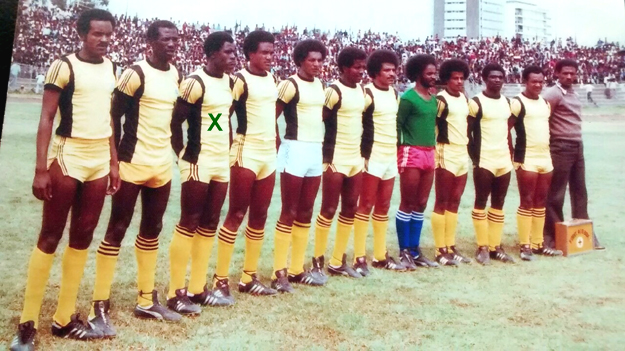
After your transfer from Berari Kokeb to Omedla you remained there until you retire. Do you think staying for so long with one club is helpful for a player?
Neguse Gebre: There is no formula that guides a player to stay for long in one club or move from club to club time and again. In my case I played for three years at Berari then landed at Omedla for the rest of my career as a footballer. Staying longer period, I think, is better idea than changing sides every time. The more you stay in one club gives wider opportunity to a player to show his talent while changing sides every time may not help to do so.
This time the players’ are given huge transfer fee. The federation has introduced a new regulation. How do you evaluate the newly introduced regulation?
Neguse Gebre: In terms of income the players are getting more or less sufficient money this time. In our time there was only monthly salary no greater than 150 Birr. Many players were forced to defect due to this serious economic problem but this time there is no fear of defection. This is a good beginning but sometimes players’ abuse what they get though the transfer fee. Clubs show willingness to spend on players to benefit from the newly joined ones. The thinking is when clubs get strong players the result would be better. Do players live up to expectations? As I see players don’t give their full capacity to the club they signed. Usually their performance declines as soon as they joined a new club simply because they don’t work hard after getting the fee. Instead they focus for another change sides with huge transfer fee. This is, I think a disturbing scenario that we observe every time. I think the new federation’s regulation is helpful to protect the interests of the clubs. If the players live up to expectations they will get what they have agreed on the contract.

How far defection negatively affected the Ethiopian football?
Neguse Gebre: The impact of defection is extremely high. For instance, during the 13th edition of the African Nations Cup staged in Libya our side had the first leg qualifier against Guinea in Conakry. The Ethiopian team had a 2-0 lead up to the 80th or so minutes. We had a 2-2 tie at the end after they converted two penalties in to the box in the dying minutes. Our side had shown superior display of football but seven of our best players Ayalew, Girma, Nigusse Asfaw, Afework, Aboneh and Dawit didn’t return to Ethiopia. Our coach the late Mengistu Worku found it extremely difficult to get equally competent players in three weeks’ time for the return leg. We had difficulty to beat Guinea on our pitch in front of our own people. The then President Colonel Mengistu Hailemariam was also present. We qualified with away goal rule after a 1-1 draw.
What was the reaction of the federation and people for that massive defection?
Neguse Gebre: The people were shocked and there was a fear that Guinea would overrun us. The federation tried to talk with the players but it was not possible to persuade them. You know our best goalie Afework Tenagashaw had a 90 birr monthly salary. After their defection their complaints were submitted to the higher authority and after that some improvements have been made. Despite that pay rise, defection continued for long.
You participated in the 10th and 13th African Cup of Nations. How do you explain the national team’s performance?
Neguse Gebre: The 10th African Cup was staged in Ethiopia in 1976. We had strong side under the head coach Peter Schnittger. The late Mengistu was his assistant. The preparation was remarkable but people who wanted to oppose the German coach Peter contributed to our failure. During the 1982 African Cup defection put heavy pressure.
In Benghazi, Libya, you played in three different places. How do you recall that performance?
Neguse Gebre: Well, in the first leg against Nigeria we lost 3-0. In this encounter I was top striker. The problem with us was our strong defender Tesfaye Gebru had health related problem, but he didn’t openly tell to the doctors. He was not able to properly defend at the back. In the second match against Zambia I was a midfielder. We conceded a 1-0 defeat. In the third match against Algeria I was defender. The game ended with a goalless tie. Our coach Mengistu Worku had the real talent to place players in the process of the competitions. If all our players who played in Guinea were in Libya the result would have been totally different.
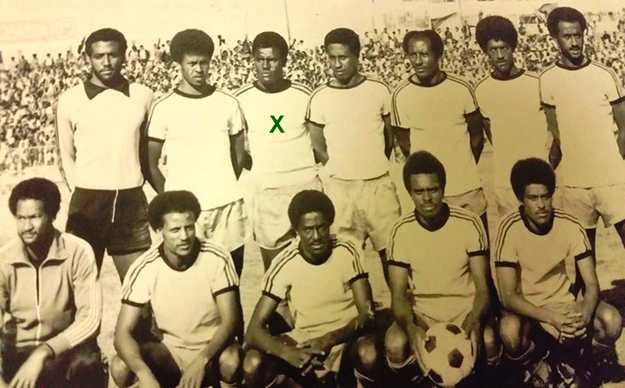
After 31 years the national side got an opportunity to take part in the 29th African Nations Cup final in South Africa. What was your impression about qualification? And what were the differences between the two?
Neguse Gebre: I was very happy about it. Seyoum Abate and I were in the technical committee. I think I have contributed something to that success. In terms of performance. There was no difference. I have seen when our side was affected by the absence of a single player but in our time seven players were missing. In terms of bonus award, this one was completely different from our time. Now the players got over 500,000 birr for their contribution in the qualifiers. This was indeed very encouraging. In our time when we qualified for Libya we were given only 500 birr. Land was free at that time but nobody thought to offer us a plot of land. When we won title during the 15th CECAFA Cup held in Addis Ababa in 1987 the players were given TV set and 5,000 birr. By then the bonus made little difference while currently the bonus has the power to change the life of the players.
You also served as a national team coach. Your achievements in that career.
Neguse Gebre: When I was the youth team coach my side has registered impressive results against the Egyptian side. In the first leg we conceded a 5-0 defeat at the hands of Egypt. From this many concluded that the national side should forfeit the second leg but we avenged that deficit by winning 5-0 over Egypt. The coach of Egypt was fired immediately after the team arrived in Cairo despite the team’s advance to the next stage defeating us on penalty shoot outs. That was a good achievement in my career. The problem with us is we don’t have a sustained youth training project. Due to this we are not able to keep on that winning spree.
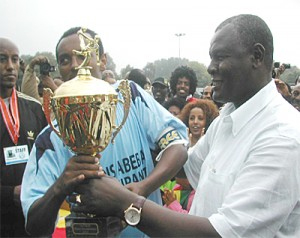
You are now working at the youth project
Neguse Gebre: Oh, yes. I am now serving as the Upper youth project as a coach. We have 50 players at Merti and Nureera. These are projects run by the Upper Awash Agro-Industry. The contribution of Jemal Ahmed who is the Chief Executive Officer is immense for the sustenance of these projects. We participated in the recently concluded Yidnekachew Memorial youth competition. Our result was not that impressive but encouraging. We won two, lost two and drew one. The trainees are students but they take the training in their spare time.
Do they have standard pitches?
Neguse Gebre: The pitches are really international standard. We don’t have pitches in Addis Ababa. Houses were constructed on all former football fields in Addis. It is the responsibility of The Ethiopian Football Federation to organize more pitches for the people. The condominiums are constructed across the country but no single football pitch is seen in these areas.
What do you suggest in this regard?
Neguse Gebre: This must be done by the federation and the concerned government offices. We must have pitches in different residential areas (condominiums). In the centre of the town there must be as many pitches as possible. This can’t be done without the cooperation of concerned government offices.
Do you think your project at the Upper Awash Agro-Industry is enough to produce young talents to the country?
Neguse Gebre: No, never. It is just a drop in an ocean. We need sustained projects in every corner of the country. The Merti and Nureera Projects could be seen as good precedents for the country’s football future. Following this model it is important to have more and more training centres in the country.
Source: Ethiopian Herald

